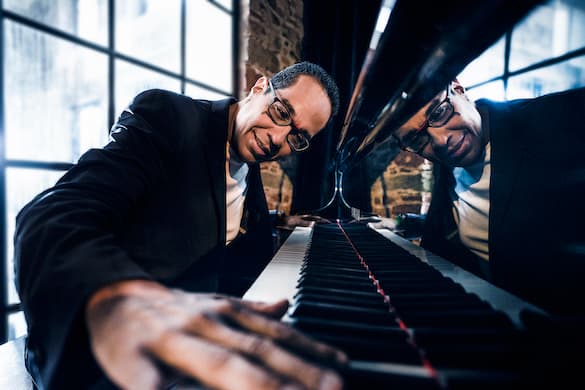Can Music Bring the World Together? Danilo Perez Seems To Be Trying
His intentions for this music are noble and optimistic, and the message is clearly that if musicians from all over the globe can work together in harmony, world leaders should, too.

Danilo Perez, ‘Crisalida’
Mack Avenue Music Group
Until recently, if you were to have asked me to tell you about Danilo Perez, I would have said he is a prodigiously gifted pianist, composer, and bandleader from Panama who works in the idiom generally known as Afro Latin Jazz.
That’s still largely true, but it’s become increasingly clear over the course of his career that he’s more interested in bringing different aspects of music together than in the idea of working in any one specific area of jazz. In other words, he strives to transcend borders and walls.
One of his first significant albums was 1995’s “Panamonk,” which, as the title suggests, was a fresh interpretation of the music of Thelonious Monk as heard through Pan-American ears. In 1999, he played on another favorite tribute to an iconic pianist-composer-iconoclast in “Mr. Jelly Lord,” Wynton Marsalis’s homage to Jelly Roll Morton.
This notion of musical and geological transcendence was driven home to me both in Mr. Perez’s latest release, “Crisalida,” and his performance of that music last weekend at Birdland. The album features nine musicians working with Mr. Perez on two extended works he describes as suites. Larger ensembles and concert-style forms are nothing new to him: He’s done several orchestral albums, among them “Motherland” (2000), “Panama Suite” (2006), “Panama 500” (2014), and, my favorite, “Across the Crystal Sea,” a 2008 collaboration with the brilliant German composer-arranger Claus Ogerman, now deceased.
Still, “Crisalida” isn’t quite like anything else in terms of either form or content. The album consists of eight tracks making up two works in four movements each. It’s highly melodic and rhythmic music that nonetheless requires several hearings to take in, and I’m grateful to have experienced roughly 90 minutes of it at Birdland, albeit in a smaller ensemble.
The group combines strings, wind instruments (including the human voice), and international rhythm, and it sounds like nothing I’ve ever heard. In a way, the smaller, five-piece ensemble he employed at Birdland — with Naseem Alatrash, cello; Vasilis Kostas, laouto; Tareq Rantisi, percussion; and vocalist Farayi Malek — seemed more tightly focused and easier to follow.
On the album, it’s easier to see the big picture, like a view from an airplane. Mr. Perez explores the idea of crossing boundaries, both stylistic and geopolitical, in the two primary works here, “La Muralla (Glass Walls) Suite” and “Fronteras (Borders) Suite.” He clearly is not a fan of walls or borders, and doesn’t intend to honor but to transcend them.
Mr. Perez uses the human voice in many different ways: there’s wordless singing from a woman named Erini on many of the tracks, as well as spoken-word passages (most not in English). The first movement of the first suite, “Rise from Love,” utilizes a children’s choir, Kalesma Children’s Choir of The Ark of the World (Kivotos tou Kosmou). The second movement, “Monopatia (Pathways),” also includes two voices singing in harmony.
Portions of “Monopatia (Pathways)” sound like a waltz, though at spots the surroundings are so disorienting that I don’t feel like I can trust my own ability to count. The longest track on the package, the 12-minute “Al-Musifir Blues,” is genuine blues — but it is so thoroughly expressed in exotic effects that I’m not sure if I would have realized that if not for the title. The main melody is played on the laouto, a Mediterranean instrument that looks like the lovechild of an oud and a bouzouki.
At Birdland, it was easier to appreciate the music on a granular level: bit by bit, passage by passage. Mr. Perez has a way of crossing borders that reminds me of the newish movie “Everything Everywhere All at Once,” in the way he seamlessly hops from one musical universe to another. One second we’re listening to something that sounds South American, and then all of a sudden we’re in Athens or Istanbul. The next thing you know, he’s gone all Asian on us.
Mr. Perez’s intentions for this music are noble and optimistic, and the message is clearly that if musicians from all over the globe — people who don’t even speak the same language, at least not verbally — can work together in harmony, why not world leaders? Quick, does anybody have Vladimir Putin’s cellphone number?

